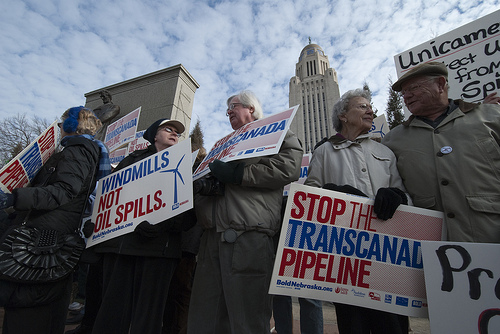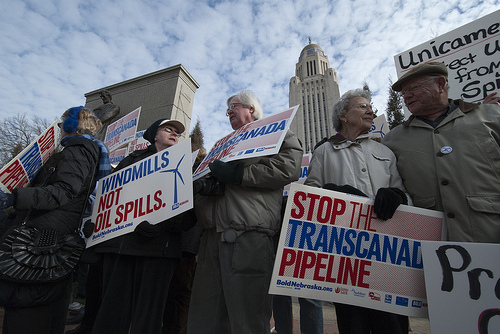 Nebraskan protesters outside the state capitol.Photo: Mitch PaineThe Keystone XL pipeline will cross six states: Montana, South Dakota, Nebraska, Kansas, Oklahoma, and Texas. Opposition has been fiercest in Nebraska, whether because of a desire to protect the Ogallala Aquifer and Sand Hills or because of tremendous organizing by Jane Kleeb and Bold Nebraska (or both). Gov. Dave Heineman (R) has called a special session of the state legislature, beginning Nov. 1, presumably to regulate safety or, if possible, route the pipeline out of Nebraska entirely.
Nebraskan protesters outside the state capitol.Photo: Mitch PaineThe Keystone XL pipeline will cross six states: Montana, South Dakota, Nebraska, Kansas, Oklahoma, and Texas. Opposition has been fiercest in Nebraska, whether because of a desire to protect the Ogallala Aquifer and Sand Hills or because of tremendous organizing by Jane Kleeb and Bold Nebraska (or both). Gov. Dave Heineman (R) has called a special session of the state legislature, beginning Nov. 1, presumably to regulate safety or, if possible, route the pipeline out of Nebraska entirely.
The red state populist rebellion is now spreading beyond Nebraska. Now, South Dakota’s Gov. Dennis Daugaard (R) wants the state legislature to impose additional restrictions on the pipeline:
Daugaard spokesman Tony Venhuizen said offering similar protections for South Dakota is only fair.
“We’ve already let TransCanada know that they can’t be cutting special deals for some states just because they protest more,” he said. “The squeaky Cornhusker wheel shouldn’t get all the grease.”
What’s going on in the remaining four states?
Montana, as the United States inlet for Keystone XL, will benefit from the pipe: Eastern Montana’s oil transport costs will be reduced. Gov. Brian Schweitzer (D) and Sen. Max Baucus (D) lobbied hard for the pipeline. Only Sen. Jon Tester (D) seems concerned about safety, and his relatively milquetoast comments may not be enough to influence the governor or legislature. At a September hearing, county commissioners from all over eastern and southern Montana favored the pipeline.
Kansas is in a unique position: The Kansas portion of Keystone XL has already been built using a 10-year municipal property tax break and is simply waiting to be hooked up on both ends. A Kansas friend tells me that most people in the state who are upset about the pipeline feel ripped off. Still, pipeline opponents showed up at a hearing in September.
Of course, a pipeline that’s already been built isn’t going to be rerouted. Nor can construction methods be put into place to make the pipeline safer. By jumping the gun, Kansas has lost its best chance to minimize spills.
The pipeline is necessary, claims its backers, to relieve a bottleneck at Cushing, Okla. Supporters far outnumbered opponents at the Oklahoma hearing. And, although Texas has some grassroots protesters, the pipeline and the jobs it would supposedly bring are welcomed at Port Arthur, Texas.
Despite supporters’ claims that the project brings jobs along all of its 1,700 miles, the economic benefits of Keystone XL will flow mostly to three states: its United States inlet in Montana, the oil hub of Cushing, Okla., and the refineries of Texas. On the other hand, South Dakota, Nebraska, and Kansas must accept the spills, contamination, and other risks of the project, without any corresponding benefit.
Nebraska’s governor and citizens have stood up for the rights of their state. Now, will South Dakota’s governor and citizens do the same?



